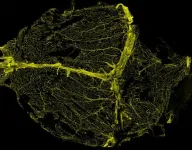(Press-News.org) Francis Crick Institute press release
Under strict embargo: 16:00hrs GMT Monday 4 December 2023
Peer reviewed
Experimental study
Animals
Researchers at the Francis Crick Institute have discovered that a common dietary supplement could protect against chronic Cryptosporidium infections which are particularly prevalent in children under two and in areas with poorer sanitation.
Cryptosporidium is a parasite that infects and damages the small intestine. It is one of the leading causes of diarrhoea-related deaths in children, and is associated with malnutrition and growth stunting. Cryptosporidium is also a common infection in people with a weakened immune system.
A previous study where human volunteers were exposed to Cryptosporidium showed that people with higher levels of indoles in their faeces prior to exposure were resistant to infection. Indoles are molecules normally found in cruciferous vegetables like broccoli, and they are known to activate the AHR system, a receptor which regulates barriers in the gut, skin, and lung.
Two labs at the Crick teamed up to investigate if, and how, the AHR system protects against Cryptosporidium infection.
In their study published today in Cell Host & Microbe, the researchers exposed mice to the Cryptosporidium parasite and observed that infection triggered an expansion of immune cells in the intestinal epithelium (the layer of cells that line the intestine), which are part of the first line of defence against the parasite.
When these CD8+ T cells were transferred to mice with weakened immune systems, the researchers saw that the mice were now able to fight off Cryptosporidium infection.
Mice that lack the AHR receptor, or healthy mice fed a diet specifically deficient in indoles, had a reduced population of intestinal CD8+ T cells. This meant the mice were less able to fight off the infection, and showed that CD8+ T cells are reliant on the AHR system to protect the intestine.
Finally, nursing mouse mothers were given indoles, which then transferred to babies through milk. When exposed to Cryptosporidium, the young mice never became ill, showing that the AHR system may be able to protect against infections in newborns.
This is important for humans, as the majority of life-threatening Cryptosporidium infections occur within a child’s first year of life. Murali Maradana, joint first author with Bishara Marzook, is now working in India to investigate the impact of giving nursing mothers indole supplements to transfer protection to their children.
Adam Sateriale, Group Leader of the Cryptosporidiosis Laboratory at the Crick, said: “Cryptosporidium causes severe illness which can be fatal, and children who are malnourished often experience recurring infections. Indole supplements could easily be added to therapeutic food formulas given to people where Cryptosporidium is prevalent, and we are very excited that Murali will be continuing to explore the potential of this intervention in his new role.”
Gitta Stockinger, Group Leader of the AHR Immunity Laboratory at the Crick, said: “By combining the expertise of our two labs, we were able to show that AHR is crucial in activating an immune response against Cryptosporidium, which could also be the case in other types of intestinal pathogens.
“Our study proves that dietary molecules which activate AHR, like indole-3-carbinol, could be used to stop a vicious cycle of chronic Cryptosporidium infections, and may protect young children from becoming ill in the first place if given to nursing mothers.”
-ENDS-
For further information, contact: press@crick.ac.uk or +44 (0)20 3796 5252
Notes to Editors
Reference: Maradana, M and Marzook, B. et al. (2023). Dietary environmental factors shape the immune defence against Cryptosporidium infection. Cell Host & Microbe. 10.1016/j.chom.2023.11.008.
The Francis Crick Institute is a biomedical discovery institute dedicated to understanding the fundamental biology underlying health and disease. Its work is helping to understand why disease develops and to translate discoveries into new ways to prevent, diagnose and treat illnesses such as cancer, heart disease, stroke, infections, and neurodegenerative diseases.
An independent organisation, its founding partners are the Medical Research Council (MRC), Cancer Research UK, Wellcome, UCL (University College London), Imperial College London and King’s College London.
The Crick was formed in 2015, and in 2016 it moved into a brand new state-of-the-art building in central London which brings together 1500 scientists and support staff working collaboratively across disciplines, making it the biggest biomedical research facility under a single roof in Europe.
http://crick.ac.uk/
END
Ketamine – an anesthetic also known for its illicit use as a recreational drug – has undergone a thorough reputational rehabilitation in recent years as the medical establishment has begun to recognize its wide-ranging therapeutic effects. The drug is increasingly used for a range of medical purposes, including as a painkiller alternative to opioids, and as a therapy for treatment-resistant depression.
In a new study published in the journal Cell Reports, Columbia biologists and biomedical engineers mapped ketamine’s effects on the brains of mice, and found that repeated use over extended periods of time leads to widespread structural changes in the brain’s ...
Two new studies led by researchers from the UCLA Jonsson Comprehensive Cancer Center give insight into how cells use energy to influence the way prostate tumors survive and grow — advancements that can help explain why some prostate cancers become resistant to hormone therapy, the most commonly used treatment for men with advanced stages of the disease.
Hormone therapy, also known as antiandrogen therapy, plays a crucial role in temporarily halting the growth of prostate cancer cells. Over time, however, the majority of patients eventually see their cancer return and progress, underscoring the pressing need for continued advancements to enhance clinical ...
Many of the most potent human oncoproteins belong to a class of proteins called transcription factors, but designing small molecule drugs that target transcription factors is a major challenge.
An international team of researchers from the Institute for Research in Biomedicine (IRB Barcelona), the Max Planck Institute for Molecular Genetics (MPIMG), BC Cancer (University of British Columbia) and other institutions has discovered a potential way to target the androgen receptor, the most prominent oncogenic transcription factor in prostate cancer, based on its propensity to form droplets also known as condensates.
The results described ...
Katy Rezvani, M.D., Ph.D., professor of Stem Cell Transplantation & Cellular Therapy at The University of Texas MD Anderson Cancer Center, has been honored with the E. Donnall Thomas Lecture and Prize from the American Society of Hematology (ASH) for her groundbreaking research to develop and advance innovative cell therapies for cancer using natural killer (NK) cells.
“I am fortunate to be able to engage in research that I am passionate about, to mentor incredible young scientists, and to collaborate with a remarkable team of researchers and clinicians. But most importantly, I am blessed to have the opportunity to undertake research that has the potential to ...
A study supported by the National Institutes of Health suggests that the response of immune system cells inside the protective covering surrounding the brain may contribute to the cognitive decline that can occur in a person with chronic high blood pressure. This finding, published in Nature Neuroscience, may shed light on new ways to counteract the effects of high blood pressure on cognition. The study was funded by the National Institute of Neurological Disorders and Stroke (NINDS), a part of NIH.
“The role of immune signaling in cognitive decline is critically important to understand,” said Roderick Corriveau, Ph.D., program director, NINDS. “These findings offer insight ...
In a recent study led by University of Florida astronomer Adam Ginsburg, groundbreaking findings shed light on a mysterious dark region at the center of the Milky Way. The turbulent gas cloud, playfully nicknamed “The Brick” due to its opacity, has sparked lively debates within the scientific community for years.
To decipher its secrets, Ginsburg and his research team, including UF graduate students Desmond Jeff, Savannah Gramze, and Alyssa Bulatek, turned to the James Webb Space Telescope (JWST). The implications of their observations, published in ...
- Interviewing Dr. Androulla Eleftheriou, Executive Director at TIF, and Dr. Zhiyu Peng, Deputy GM at BGI Genomics, Head of the World Hemoglobinopathy Foundation
Thalassemia, a hereditary hemoglobinopathy, occurs in 4.4 out of every 10,000 live births and is prevalent in Mediterranean coastal areas, Africa, the Middle East, Southeast Asia, and southern China.
Screening and antenatal diagnosis reduced the frequency of β-thalassemia in many Mediterranean countries. Focusing on other regions with high thalassemia prevalence, BGI Genomics has launched the Global 2023 State of Thalassemia Awareness Report, covering 1,847 ...
ARLINGTON, Va., BETHESDA, Md., CHICAGO and DALLAS, Dec. 4, 2023 — During National Influenza Vaccination Week (December 4-8, 2023), leading public health organizations are encouraging everyone to get a flu shot if they have not already done so. The flu is more than an inconvenience: it can lead to hospitalization, worsening of chronic medical conditions or even death. An annual flu vaccine is the best way to help prevent complications from the flu. [1]
The American Heart Association®, the American Lung Association,® the American ...
Scientists from Stockholm University have investigated the mechanisms that create cool microclimates beneath forest canopies during warm and dry summer days. The study reveals how canopy shading and water evaporation together create cooler forest microclimates compared to temperatures outside forests. The article is published in Agricultural and Forest Meteorology.
”The findings are alarming in the context of climate change as more frequent and more severe droughts may threaten the cooling functions of forests,” says Caroline Greiser, researcher at the Physical Geography Department, Stockholm ...
A scientific study published in PeerJ Life & Environment sheds light on the potential game-changing impact of advanced footwear technology (AFT) on elite sprint performances in track and field. The research, titled "The Potential Impact of Advanced Footwear Technology on the Recent Evolution of Elite Sprint Performances," reveals the significant strides made in sprint performance and suggests that AFT has played a pivotal role in these improvements.
Elite track ...




